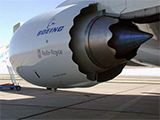 Boeing Thursday notified all operators of 777 aircraft flying with Rolls-Royce Trent engines that the aircraft’s fuel system is subject to compromise by ice. The notice is in agreement with both the NTSB and AAIB respectively that ice accretion in the fuel system was the cause when a Delta Airlines Boeing 777-200ER on Nov. 26 lost power while cruising over Montana at 39,000 feet and when a British Airways 777 famously crash-landed short of the runway at Heathrow on Jan. 17, 2008. Boeing’s outreach included precautionary measures for flight crews piloting the aircraft through cold weather, that supersede those it issued in September (which, as evidenced by the Delta flight, did not resolve the problem). It is likely that a redesign will eventually grace the fuel system in the form of an airworthiness directive from the FAA. For now, triple-seven pilots flying with Trent engines are being asked to advance the throttles to maximum thrust before descent on flights that have maintained the same altitude for two hours. Boeing has outlined other precautionary procedures and it is likely that the FAA will make them mandatory as they did with those Boeing issued in September. Investigators of both the Delta and the Heathrow incident have a new target.
Boeing Thursday notified all operators of 777 aircraft flying with Rolls-Royce Trent engines that the aircraft’s fuel system is subject to compromise by ice. The notice is in agreement with both the NTSB and AAIB respectively that ice accretion in the fuel system was the cause when a Delta Airlines Boeing 777-200ER on Nov. 26 lost power while cruising over Montana at 39,000 feet and when a British Airways 777 famously crash-landed short of the runway at Heathrow on Jan. 17, 2008. Boeing’s outreach included precautionary measures for flight crews piloting the aircraft through cold weather, that supersede those it issued in September (which, as evidenced by the Delta flight, did not resolve the problem). It is likely that a redesign will eventually grace the fuel system in the form of an airworthiness directive from the FAA. For now, triple-seven pilots flying with Trent engines are being asked to advance the throttles to maximum thrust before descent on flights that have maintained the same altitude for two hours. Boeing has outlined other precautionary procedures and it is likely that the FAA will make them mandatory as they did with those Boeing issued in September. Investigators of both the Delta and the Heathrow incident have a new target.
Challenged by the fact that the key element in their theories would melt away before it could be observed, investigators currently believe the ice problem originates with the Trent’s fuel-oil heat exchange system. If the heat generated by the exchanger is insufficient, moisture could freeze in the fuel system, blocking fuel and starving the engines.


































